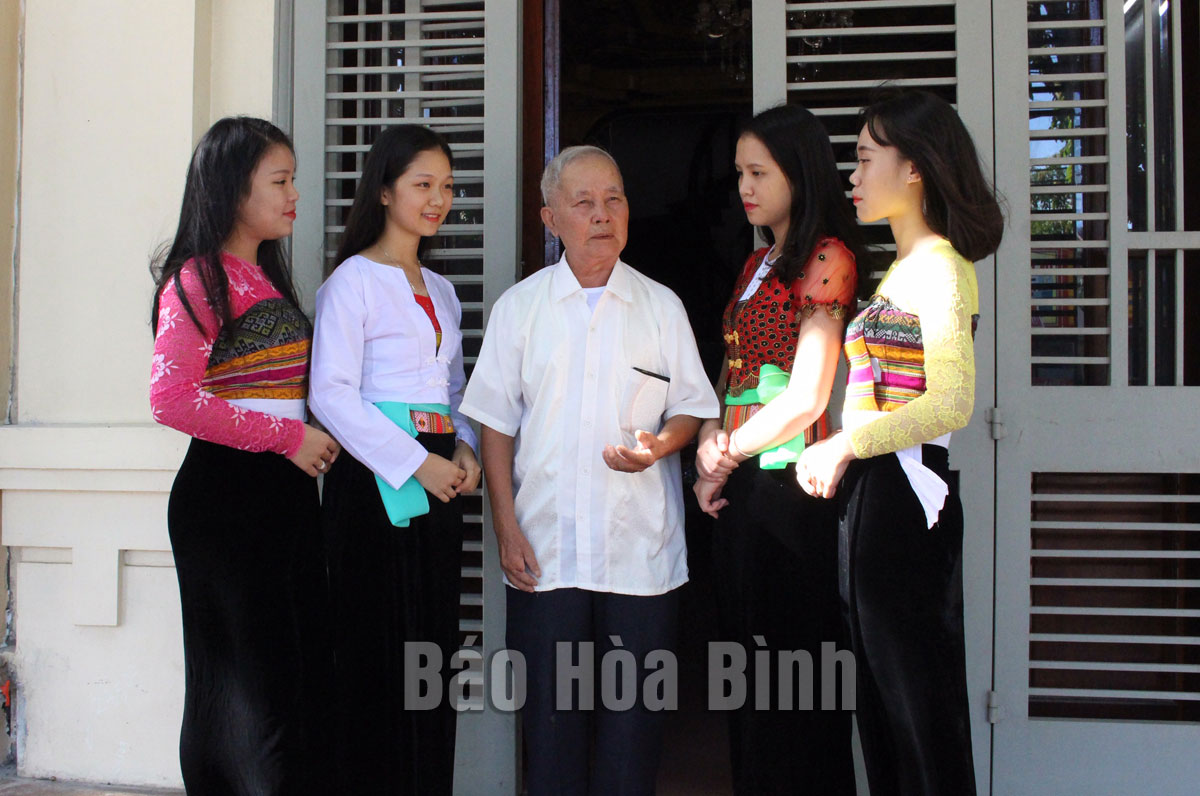
(HBO) – Pham Ngoc The, former Deputy Director of the Hoa Binh Socialist Labour Youth School (now the province’s Boarding High School for Ethnic Minority Students) was among the people having chances to meet President Ho Chi Minh. He said it was his honour to meet the President thrice and directly listen to the late leader’s kind and warm teachings.
Pham Ngoc The, former Deputy Director of the Hoa Binh
Socialist Labour Youth School (now the province’s Boarding High School for
Ethnic Minority Students), tells the school’s students about the times he met
President Ho Chi Minh.
The first time was when President Ho Chi Minh
visited the province’s school for agricultural collectivisation near Ngoc
Terminal in Ky Son district, now Hoa Binh city, on October 19, 1958.
The said the leader’s teachings are still deeply
in his mind now. President Ho Chi Minh said during the trip that if cadres were
not dedicated to working, studying, and making self-improvement, they would lag
behind and lose the people’s trust, so cadres must constantly improve their
knowledge, political mettle, and professional capacity.
In 1960, while The was working at the
construction site of Road 12B in Kim Boi district, he was chosen to represent
local young people at the congress of the northern region’s hard-working
socialist youths, held in Hanoi on March 16. At this event, he once again met
Uncle Ho.
He said President Ho Chi Minh’s opinions at the
congress had left a strong impression on him. The leader called on the young
delegates to exert stronger efforts, stay modest, keep learning, fulfil every
task assigned by the Party and the people, and that they should do good deeds,
even small ones, and avoid every bad thing, which are also the teachings The
often repeats when talking to his descendants.
On August 17, 1962, Uncle Ho paid a visit to the
Socialist Labour Youth School, which was the third time The met him. At that
time, The was surprised that the leader visited the school’s kitchen, where The
was working as manager, as soon as he arrived.
Talking to the school’s cadres, teachers, and
students, the President asked for increased farming and cooking to improve
portions and meal quality, along with enhanced solidarity and discipline, and
further practice of democracy.
Uncle Ho’s teachings have served as a driving
force for the school’ teachers and students to make unceasing efforts to
surmount every difficulty, The added./.
In the spirit of "Party members go first, the people follow”, all households of Party members in the Doan Ket sub-region in Da Bac town, Da Bac district, voluntarily removed gates and fences, and donated land when the road expansion project passed through their properties. Inspired by their example, 68 households in the sub-region quickly followed suit, contributing over 1,400 sq.m of residential and perennial cropland to widen the main road through the residential area. The exemplary role of Party members in Doan Ket stands as a shining example of studying and following President Ho Chi Minh’s thought, morality, and lifestyle.
The Hoa Binh provincial People's Committee held a monthly meeting on May 29 to assess the implementation of socio-economic development tasks in the first six months of 2025, the progress of key projects, and some other important issues.
During his lifetime, President Ho Chi Minh always expressed his deep affection and special concern for children and youth. He once emphasized: "Caring for and educating children well is the responsibility of the entire Party and the entire people”; "First of all, the family (i.e. grandparents, parents, siblings) must do this job well”. "the Party Committees…, the Children’s Committee, the Youth Union, the education sector, and all related organizations must have specific plans to ensure children grow healthier and more progressive”. His teachings has been remaining valuable and serving as the guiding principles in the work of protecting, caring for, and educating children. In line with this ideology, Hoa Binh Province has continuously been prioritizing and investing resources in the well-being of children in recent years.
Mr. Nguyen Phi Long, the alternate Member of the Party Central Committee and Secretary of the Provincial Party Committee chaired the meeting of the Standing Committee of the Provincial Party Committee to provide opinions on several investment projects within the province. There was the attendance of Ms. Bui Thi Minh, the Permanent Deputy Secretary of the Provincial Party Committee and Chairwoman of the Provincial People’s Council; Mr. Bui Đuc Hinh, the Deputy Secretary of the Provincial Party Committee and Chairman of the Provincial People’s Committee and other members of the Standing Committee; the leaders from other departments, agencies, and some localities.
The Standing Board of the Vietnam Fatherland Front (VFF) Committee of Hoa Binh province held a meeting on May 28 to honour outstanding village elders, village heads, and reputable individuals from local ethnic minority and religious communities.
In mid-May, the provincial Museum organised an exhibition named "Duoi la co Dang Cong san Viet Nam quang vinh” (Under the flag of the glorious Communist Party of Vietnam). This meaningful activity took place in the joyful atmosphere to celebrate the country's major holidays and the Party congresses at all levels for the 2025-2030 term, towards the 14th National Party Congress.



